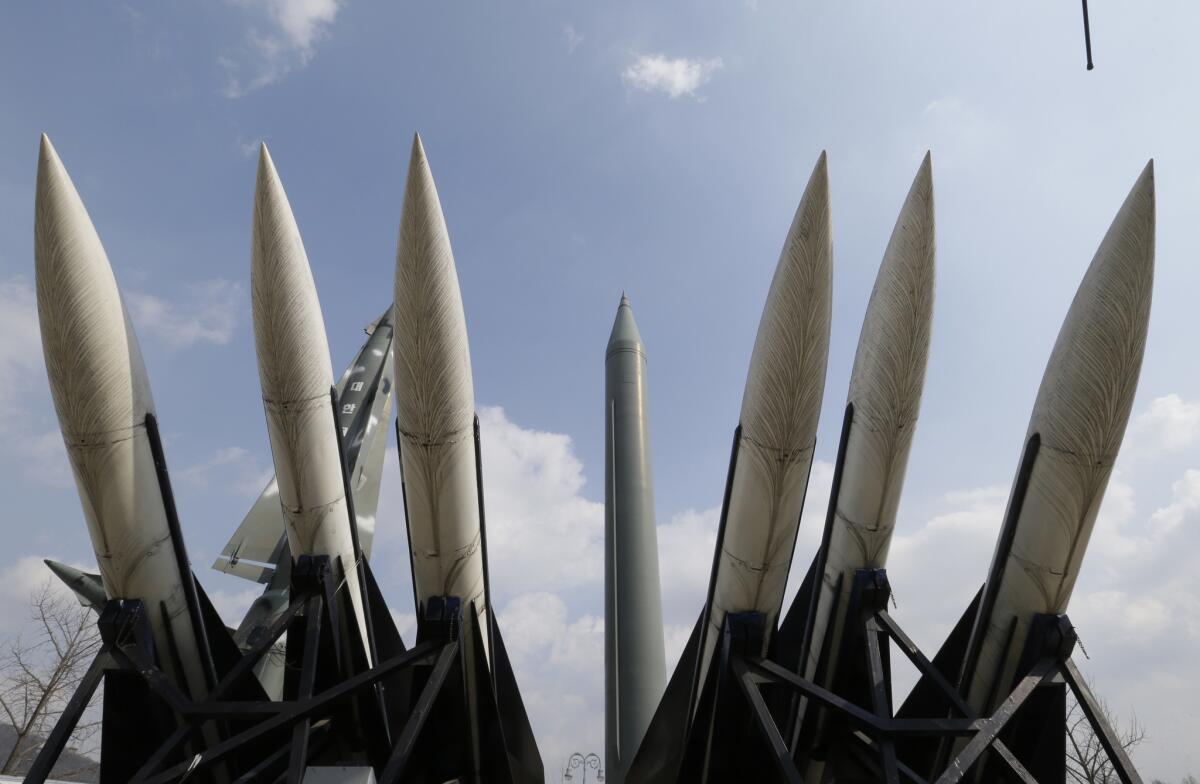U.S. gets China’s support for new U.N. sanctions on North Korea

A mock Scud-B missile of North Korea, center, and South Korean missiles are displayed at the Korea War Memorial Museum in Seoul. The U.S. and China have reached agreement on tougher sanctions on North Korea, U.N. diplomats said.
- Share via
Reporting from Washington — With China’s backing, U.S. diplomats unveiled what they described as a plan for the toughest international sanctions in two decades against North Korea in response to its recent nuclear and ballistic missile tests.
The sanctions are part of a resolution submitted Thursday to the United Nations Security Council. Without a Chinese veto, the resolution is all but certain to pass in coming days.
Under the resolution, North Korea could not import aviation fuel and limits would be placed on its exports of coal, iron, gold and titanium, U.S. Ambassador to the U.N. Samantha Power said at a news conference.
Join the conversation on Facebook >>
The resolution also would impose inspections of all cargo going in or out of North Korea, tighten restrictions on North Korean banking, ban acquisition of dual-use nuclear material and blacklist additional individuals and companies.
Power said the resolution would impose the “strongest set of sanctions in more than two decades” and would “break new ground.”
The sanctions will “deliver an unambiguous message … [that] the world will not accept your actions [and] we will work relentlessly and collectively to stop your nuclear program,” Power said.
North Korea’s state media typically issues apocalyptic threats when the country believes it is under threat. At a minimum, the sanctions are likely to increase tension in the region.
China’s support for the crackdown was the biggest surprise. It came as Chinese Foreign Minister Wang Yi wound up intense negotiations in Washington with Secretary of State John F. Kerry and other Obama administration officials.
Speaking Thursday to a Washington think tank, Wang said the resolution would “limit the development of nuclear missile technologies” by North Korea.
Wang told the nonpartisan Center for Strategic and International Studies that China and the U.S. agreed to attempt to avoid sanctions that harm the North Korean people.
He said the goal was “to uphold the international nuclear nonproliferation regime.”
Kerry traveled to Beijing last month to implore China to act to curtail the Kim Jong Un government in Pyongyang, which conducted an underground nuclear test on Jan. 6 that it said was a hydrogen bomb.
U.S. officials say initial measurements indicated a much lower-yield device, but the test -- North Korea’s fourth so far -- violated Security Council resolutions.
A month later, North Korea launched a rocket that put a small satellite into orbit. The U.S., Japan and South Korea described the launch as a ballistic missile test.
China is North Korea’s chief trading partner and is wary of taking punitive actions that might cause its neighbor’s beleaguered economy to collapse, or that could spark a war on its border.
China also agreed to sanction North Korea in 2013 after Pyongyang’s belligerent threats of additional nuclear tests.
“It’s not easy, but it certainly is an indication that the United States and China, when our interests are aligned, can cooperate quite effectively to advance the interest of citizens in both our countries,” White House spokesman Josh Earnest told reporters.
For more news about global affairs, follow @TracyKWilkinson.
More to Read
Sign up for Essential California
The most important California stories and recommendations in your inbox every morning.
You may occasionally receive promotional content from the Los Angeles Times.











